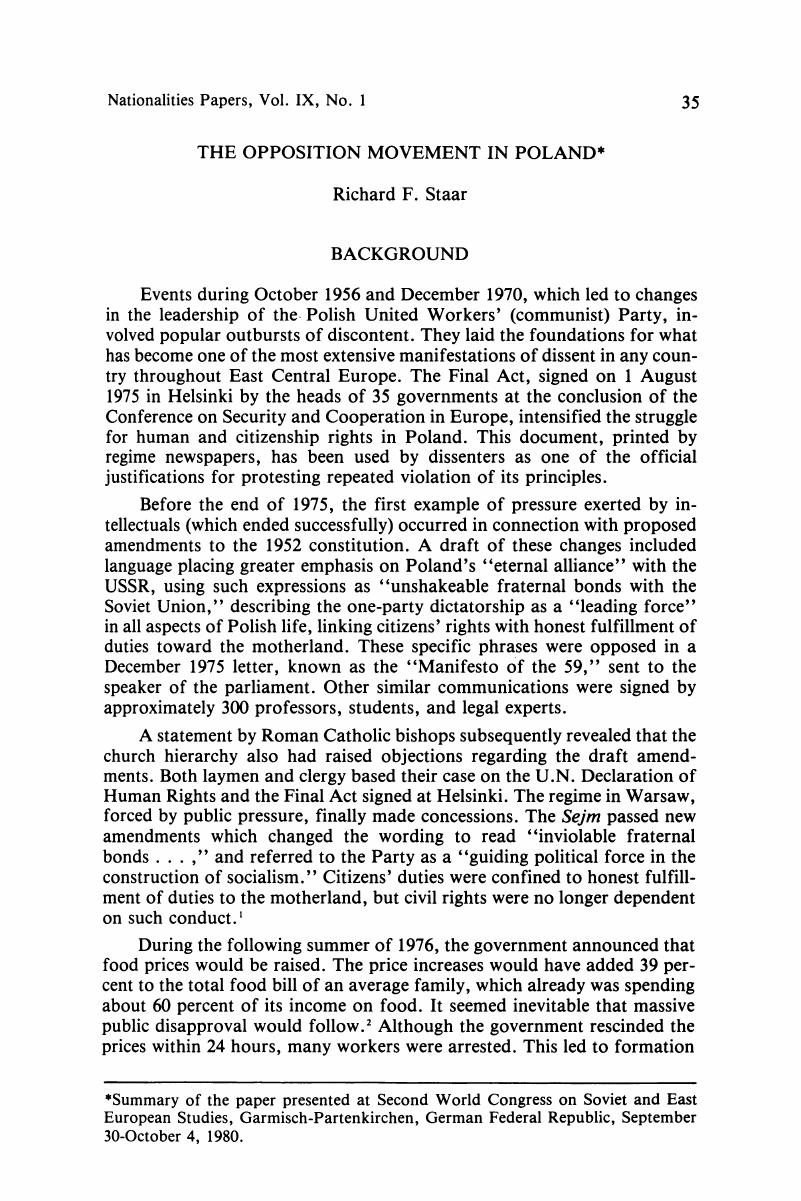No CrossRef data available.
Published online by Cambridge University Press: 20 November 2018

1. L. Stachow, “The Struggle for Democracy in Poland;” paper submitted at the Leeds Castle Conference on 11-13 May 1979 (London). The new text appeared in Dziennik Ustaw, no. 5 (10 February 1976).Google Scholar
2. Stachow, ibid., p. 6.Google Scholar
3. Walter D. Connor, “Dissent in Eastern Europe: A New Coalition?,” Problems of Communism (January/February, 1980), p. 8.Google Scholar
4. Adam Bromke, “The Opposition in Poland.” Problems of Communism (September/October 1978), p. 43.Google Scholar
5. J. B. de Weydenthal, “Workers’ Dilemma of Polish Politics: A Case Study.” East European Quarterly, XIII, No. 1 (Spring 1979), pp. 98-99.Google Scholar
6. Speech by Council of Trade Unions president, Wladyslaw Kruczek, to 7th congress, as published in Trybuna Ludu (14 November 1972), pp. 5-6.Google Scholar
7. News Abstracts, IV, No. 1 (January 1980); Ann Arbor, Michigan.Google Scholar
8. Paris interview with Edward Lipiński in December 1977, as published by Orzel Bialy (February 1978), p. 22; London.Google Scholar
9. Xavier Mooshiitter, “Polens Nachbar im Westen: Deutschland,” Osteuropa (February 1979), pp. 137-146.Google Scholar
10. David Floyd, “Kremlin Stooges in Poland Face Live Opposition,” Daily Telegraph (26 March 1979); London.Google Scholar
11. Edward Hughes, “Poland's Rising Tide of Dissent,” Reader's Digest (May 1979), p. 165.Google Scholar
12. Bernard Margueritte, “Interdiction and Attempts at Dialogue,” Le Figaro (23 January 1979); Paris.Google Scholar
13. Corriere della Serra (5 March 1979); Milano.Google Scholar
14. Washington Post (2 August 1979); The Economist (8 September 1979), London; Le Monde (19 September 1979); Paris.Google Scholar
15. Leopold Unger, “Grounding Poland's Flying University,” International Herald Tribune (14 December 1979); Paris.Google Scholar
16. William F. Robinson, “Whither Dissent in Poland?,” RAD Background Report, no. 101 (26 May 1978).Google Scholar
17. Walter D. Connor, “Dissent in Eastern Europe: A New Coalition?,” Problems of Communism (January-February 1980), pp. 9 and 17.Google Scholar
18. “Rozmowa Kisiel-Michnik,” Kultura (May 1978), pp. 10-15; Paris.Google Scholar
19. Note, however, the opposite view which describes the opposition as follows: … The virtual disregard for party dissident movements or internal liberalizers by those on “the outside” reflects the fact that the dissidents view their task as a direct appeal to society itself. They must talk with and guide society, from below — not to try to use the Party dissenters and tactics from within to manipulate or bring about a change in the character of the system. Jan B. de Weydenthal, Poland: Communism Adrift. (Beverly Hills: Sage Publications, 1979), p. 56.Google Scholar
20. Much of the foregoing and following is based on an unpublished manuscript by Jadwiga Staniszkis, “Dialectics of a Socialist Society: The Case of Poland,” being reviewed by Princeton University Press for possible publication as a book.Google Scholar
21. Signifies pre-1939 Stronnictwo Narodowe (National Party), anathema to leftist intellectuals.Google Scholar
22. See the interview with Jacek Kuron in Der Spiegel (4 August 1980), pp. 98-100; Hamburg.Google Scholar
23. New York Times (18 August 1980).Google Scholar
24. Association of Polish Students and Graduates in Exile, Dissent in Poland: December 1975-July 1977 (London, 1977).Google Scholar
25. Peter Raina, Political Opposition in Poland, 1954–1977 (London: Poets and Painters Press, 1978), pp. 75-90.Google Scholar
26. Jacques Rupnik, “Dissent in Poland, 1968-78,” in Rudolf Tŏkes (ed.), Opposition in Eastern Europe (Baltimore: The Johns Hopkins University Press, 1979), pp. 60-112.CrossRefGoogle Scholar
27. Sources: Statistical Yearbook (1971, 1974, 1978) and the 1980 budget approved by parliament; given in Staniszkis, op. cit. Google Scholar
28. Boris Lewytzkyj and Juliusz Stroynowski (eds.), Who's Who in the Socialist Countries (New York: K. G. Saur Publ. Co., 1978), pp. 35-36.Google Scholar